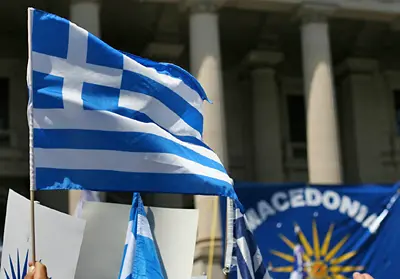Greece and the Former Yugoslav Republic of Macedonia (FYROM) on Thursday said they are willing to cooperate in the long standing name dispute, although big differences remain.
Greece's Foreign Affairs Minister Nikos Kotzias and his FYROM counterpart Nikola Poposki expressed the two countries' willingness to cooperate to resolve the name dispute, face the refugee crisis and address other issues of mutual interest.
However, in their talks in Athens both officials stressed that significant differences remained.
"We want our collaboration in the refugee issue and to contribute to the stability of the wider region," Kotzias said.
In regards to the name issue the two neighbors were seeking a "fair compromise" to respond to extreme nationalism, he said.
"As our countries are divided by mountains geographically, there are also major obstacles," Poposki commented on his part regarding the name dispute that divides the two sides since 1991, when Skopje declared its independence from then Yugoslavia.
Athens has been disputing the use of the name "Macedonia" since then, arguing that it implies territorial claims from the newly founded Balkan state.
Despite the name dispute, the two neighbors have stepped up efforts to strengthen cooperation in sectors ranging from trade and energy to tourism lately.
On the agenda of discussions on Thursday, according to Kotzias, was also FYROM's European prospects, collaboration in the energy sector, as well as the refugee crisis.
Athens has protested Skopje's recent decision to erect a fence across the borderline and allow only refugees crossing into the country to continue their journey to other more prosperous parts of Europe.
The measure has raised problems and tensions in Greece, as thousands of economic migrants have been stranded in the debt laden country.
"In a situation like this, I refer to the refugee crisis, we should do our best to offer humane conditions to people crossing our countries," Poposki said.
He stressed that the tightening of border controls was a "temporary measure" that will stay for as long as deemed necessary.
 简体中文
简体中文



